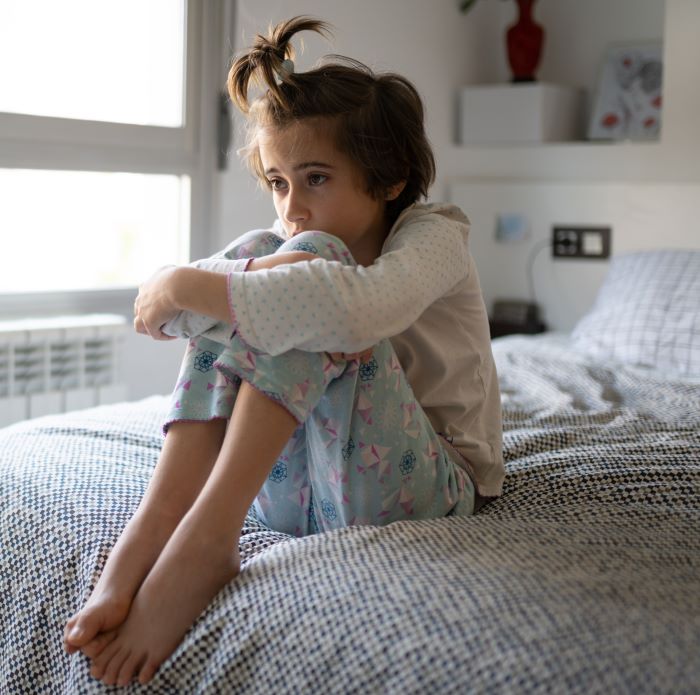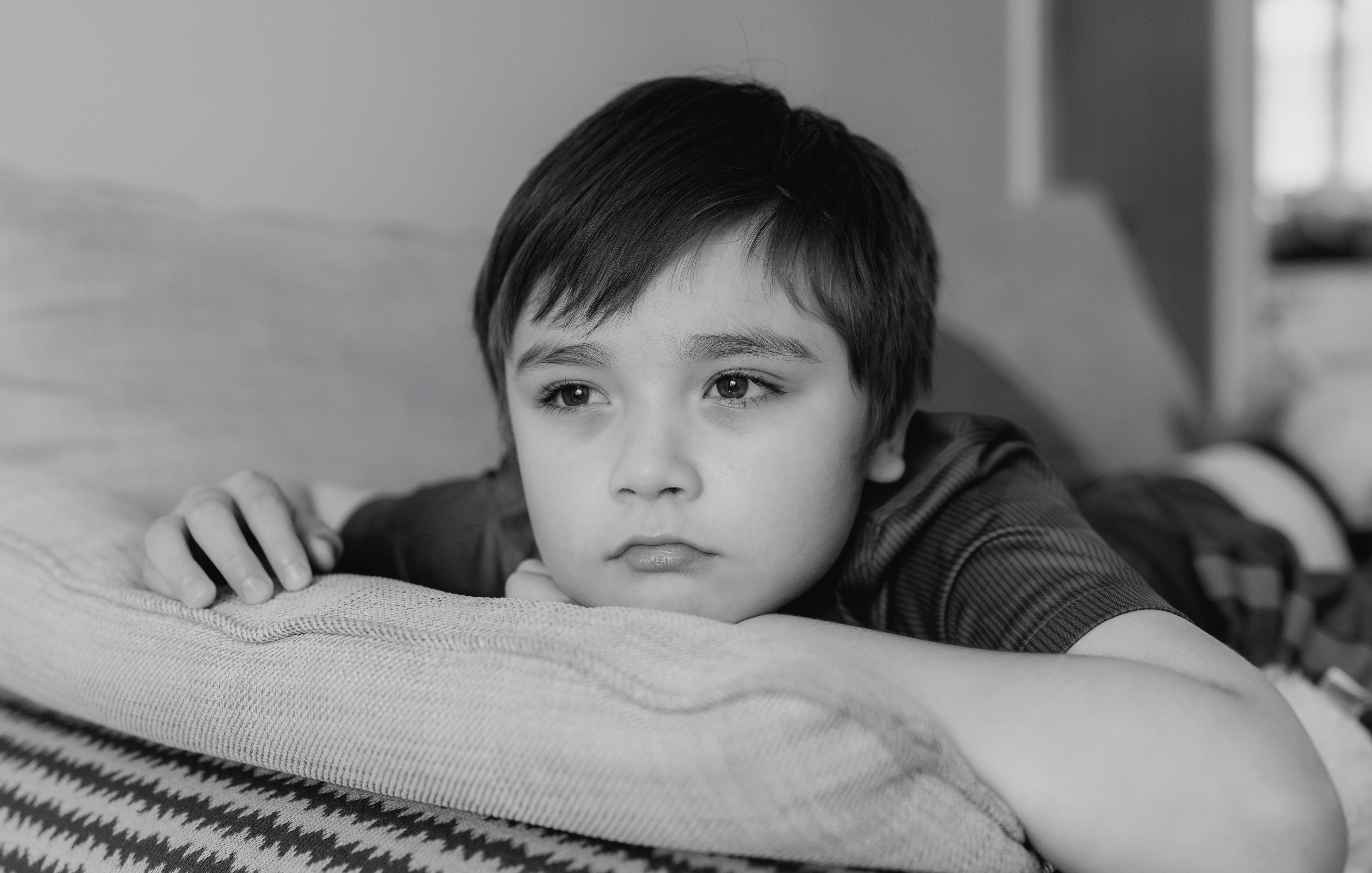Expert Sleep Help For School Age Children (5 to 11 Years Old)
Is your primary school-aged child struggling with sleep? You're not alone — and we're here to help.
Between the ages of 5 and 11, children experience enormous growth — not just physically, but emotionally, socially, and cognitively. As their independence and self-awareness grow, so too can their worries. Managing schoolwork, friendships, after-school activities, and growing responsibilities can leave many children feeling overwhelmed — and that stress often shows up at bedtime.
Even children who previously slept well can begin to resist bedtime, struggle to fall asleep, or wake frequently during the night. Common sleep challenges in this age group include bedtime anxiety, screen-related sleep disruptions, night-time fears, and early signs of delayed sleep phase as children approach the pre-teen years. These issues are often intensified by big life transitions such as moving house, changing schools, friendship worries, or family stress.
For some children — particularly those who are neurodivergent or have underlying health needs — sleep can be even more complex. Sensory sensitivities, heightened anxiety, or biological differences in melatonin production can all contribute to disrupted sleep patterns and bedtime resistance.

As experienced health professionals with over 30 years of expertise, our team is grounded in sleep science and child development. We'll work with you to create a gentle, personalised sleep plan that truly fits your child's needs and helps your whole family get the rest you deserve.
Get Help
We're Trusted By The NHS & More
We are proud to be the largest provider of sleep training for the NHS since 2007, and the only private sleep clinic entrusted to deliver this service.






We train NHS health professionals across the UK
and have trained more than any other organisation since 2007!
Common Sleep Issues
Understanding Your Child's Changing Sleep Needs
As children move through the primary school years, their total sleep needs gradually begin to decline. While younger children may need around 11–12 hours of sleep per night, older children in this age range may function well with 9–10 hours. It's important to recognise that sleep patterns are not only shaped by age, but also by each child's unique biological rhythm — known as their chronotype.
Chronotype refers to whether your child is naturally more of a "morning lark" or a "night owl." These tendencies are largely inherited and influence when a child naturally feels sleepy or most alert. Some children wake early and are ready to start the day, while others are more active and alert in the evenings — and may struggle to fall asleep at an earlier bedtime.
Understanding your child's chronotype can help you set realistic expectations for bedtime and avoid unnecessary battles. For example, trying to get a night-owl child to sleep too early can backfire, leading to frustration, prolonged settling and potentially sleep anxiety. Likewise, early-rising children may benefit from slightly earlier bedtimes to ensure they get enough sleep.
 Jump To An Issue:
Jump To An Issue:
- Bedtime Anxiety and Difficulty Falling Asleep
- Difficulty Falling Asleep Without You
- Delayed Sleep Phase
- Anxiety About Not Getting Enough Sleep
- Nightmares
- Night Terrors
- Night Waking and Bed Swapping
- Sleepwalking and Sleep Talking
- Bed Wetting
- ADHD and Autism-Related Sleep Difficulties
- Snoring and Sleep Apnoea Concerns
Struggling to Fall Asleep
Bedtime Anxiety and Difficulty Falling Asleep
Even if your child seems fine during the day, bedtime often brings a quiet moment where worries surface. They may start to think about school, friendships, personal safety, or family matters — all of which can make it harder to switch off. Children at this age are developing greater self-awareness, but often don't yet have the tools to manage their thoughts or articulate their fears. As a result, they may appear restless, tearful, or overly chatty at bedtime — all signs of emotional overload.
Difficulty Falling Asleep Without You
Despite increasing independence, many children still rely on a parent's presence to fall asleep. They might ask for extra cuddles, want you to lie with them, or feel unable to settle alone. These behaviours are often linked to bedtime anxiety or habits formed when younger. While understandable, they may mean your child struggles to fall asleep without your presence — and if they wake during the night, need the same support from you to get back to sleep.
Sleep Habits That Disrupt Sleep
Inconsistent bedtimes, limited wind-down time, and screen use before bed are all common factors that can disrupt your child's ability to fall asleep. Using phones or tablets close to bedtime can overstimulate the brain, making it harder for your child to switch off and relax. Fast-paced content, exciting games, or even emotionally charged conversations can leave them feeling wired rather than sleepy — delaying the onset of sleep and affecting how well they settle for the night.
Delayed Sleep Phase
As children near the pre-teen years, some begin to show signs of delayed sleep phase — a shift in their natural body clock that makes them feel sleepy later in the evening. While still biologically suited to earlier bedtimes, this change can make falling asleep at a typical time more difficult. Children may lie awake for hours despite being in bed, leading to difficulty waking in the morning and tiredness throughout the school day.
Anxiety About Not Getting Enough Sleep
Some children become so focused on getting enough sleep that the pressure itself keeps them awake. They may clock-watch, count down the hours left until morning, or feel panicked if they can't drift off quickly. This cycle of worry and wakefulness can be frustrating for both child and parent, and often requires gentle reassurance, supportive routines, and a reset of unhelpful sleep beliefs.
Get HelpNight-Time Disruptions and Sleep Fears
Nightmares
As children grow, their imagination becomes more detailed — and so do their dreams. For 5 to 11-year-olds, nightmares are a common part of emotional processing and healthy brain development. They often become more complex at this age, reflecting real-life worries or things they've seen or heard. Nightmares might involve being chased, getting lost, being separated from loved ones, or something bad happening to their family or pets.
These vivid dreams can feel very real and often lead to your child waking up distressed, frightened, or tearful. They may find it hard to go back to sleep without reassurance. Triggers can include a stressful day, exposure to scary or age-inappropriate content, anxiety about school, social issues, or significant life changes like moving house or a family separation.
While upsetting, nightmares are normal at this stage — they're a sign that your child is trying to make sense of their feelings and the world around them. A calm, comforting response and time to talk about their worries during the day can help reduce the frequency and intensity of nightmares over time.
Night Terrors
Although more common in younger children, night terrors can still occur in children aged 5 to 11. These episodes usually happen during the first few hours of sleep, during deep non-REM sleep. A child may suddenly sit up, scream, cry, or appear panicked — often with their eyes open — but they are not fully awake and may not respond to comfort in the usual way.
Night terrors can be particularly distressing to watch, but children typically don't remember them the next morning. They are not caused by scary dreams and are not a sign of psychological distress. Instead, they are a type of sleep disturbance often linked to:
- Being overtired
- Stress, illness, or fever
- A sudden change in routine
- A family history of night terrors or sleepwalking
Trying to wake a child during a night terror can prolong the episode, so the best approach is to stay nearby, keep them safe, and allow it to pass. If night terrors are frequent or intense, we can help you review your child's sleep schedule and any possible triggers to reduce how often they happen.
Night Waking and Bed Swapping
Frequent night waking often becomes a habit, especially if your child relies on parental presence to settle. Some children leave their bed to come into yours, or call for you repeatedly during the night. While comforting them feels like the easiest solution in the moment, this pattern can lead to fragmented sleep for the whole family.
Sleepwalking and Sleep Talking
Many children experience episodes of sleepwalking or talking, particularly if they're overtired or going through a developmental leap. These behaviours usually occur during deep sleep and are not typically cause for concern, but they can be unsettling to observe and may signal that your child's sleep routine needs adjustment.
Bed Wetting
While many children are dry at night by this age, bed wetting (nocturnal enuresis) is still considered developmentally normal up to around 7 years old. Some children continue to have occasional or regular wet nights well into the primary school years.
Bed wetting is not usually a behavioural issue, and it's rarely something a child can control. It may be linked to genetic factors, a slower-developing bladder, deep sleep, or lack of fluid intake during the day and then topping up early evening and before bed. It can also become more frequent during times of stress, illness, or big life changes.
Although it often resolves naturally with time, bed wetting can affect your child's confidence, especially as they become more socially aware or want to join in with sleepovers and school trips. It can also impact the quality of their sleep — and yours.
Get HelpSleep Challenges Linked to Neurodiversity and Health
ADHD and Autism-Related Sleep Difficulties
Children with ADHD or autism are significantly more likely to experience sleep challenges — including difficulty falling asleep, staying asleep, frequent night waking, and early rising. These difficulties are often linked to a range of factors, such as heightened sensory sensitivities, differences in melatonin production and circadian rhythm, anxiety, and difficulty transitioning from wakefulness to sleep.
For some children, the bedtime routine itself can be a source of stress — particularly if they struggle with unpredictability, changes in environment, or feelings of being overwhelmed after a busy day. Even when a child appears not to need much sleep, it's often the case that they're simply unable to access the sleep they truly need without the right support.
We understand that sleep strategies for neurodivergent children need to be highly individualised, flexible, and rooted in compassion. At Millpond, we take the time to learn about your child's specific needs, preferences, and routines, and we work closely with you to develop a gentle, supportive approach that works for your family.
Snoring and Sleep Apnoea Concerns
While occasional snoring can be harmless, persistent loud snoring, gasping, pauses in breathing, or restless sleep in children may be signs of obstructive sleep apnoea (OSA). Although more often associated with adults, OSA can affect children too — particularly between the ages of 3 and 11 — and may have a significant impact on their health, mood, and learning.
In children, OSA is often related to enlarged tonsils or adenoids, though other contributing factors can include asthma, allergies, obesity, or a family history of sleep apnoea.
Signs to watch for include:
- Loud, habitual snoring most nights
- Pauses in breathing or gasping during sleep
- Restless sleep or frequent awakenings
- Night sweats or sleeping hot
- Sleeping in unusual positions — such as with the neck extended or head tipped back to open the airway
- Daytime sleepiness, irritability, or hyperactivity
- Difficulty concentrating or academic concerns
- Bedwetting in children aged 6 or older who were previously dry at night
Many of these signs are easy to overlook or attribute to other causes, but together they may point to disrupted breathing during sleep.
When to Seek Help
If your child is consistently showing any of these signs — especially loud snoring, gasping, or changes in daytime behaviour — it's important to speak with your GP. They may refer you to an ENT specialist or sleep clinic for further assessment, which might include a sleep study to monitor your child's breathing overnight.
At Millpond, while we don't diagnose sleep apnoea, we can help you track symptoms, identify concerns, and support your child's sleep while you seek medical advice. If sleep apnoea is ruled out, we'll work with you to understand and address any other underlying sleep issues that may be disrupting your child's rest.
Get HelpHelping your child feel secure at bedtime — and giving you peace of mind.
When your child is struggling with sleep, it can impact every part of family life. You may feel frustrated, confused, or helpless — especially when your child can't explain what's wrong, or when the strategies that once worked no longer do. Whether they're battling bedtime fears, waking through the night, or feeling anxious about sleep itself, it's easy to feel like you're stuck in a cycle that's hard to break.
At Millpond, we understand that sleep in the primary school years is about more than just routines. It's about recognising what's going on underneath — from rising emotional awareness and growing independence to neurodiversity, life changes, or simply habits that have slowly built up over time.
We take a whole-child approach, grounded in sleep science, and over 30 years of hands-on experience. We'll work with you to gently uncover what's driving your child's sleep challenges, their sleep needs and their chronotype and build a tailored, step-by-step plan that fits your family's lifestyle. Our strategies are always practical, respectful, and rooted in your child's unique temperament and needs.
With the right support, your child can learn to settle more confidently, sleep more soundly, and feel secure in their own sleep space. And you can feel reassured, rested — and ready to enjoy calmer evenings and brighter mornings together.
Get HelpContact Us Today
Simply fill in our contact form below or call us on 020 8444 0040
and we'll be in touch to discuss your needs.
